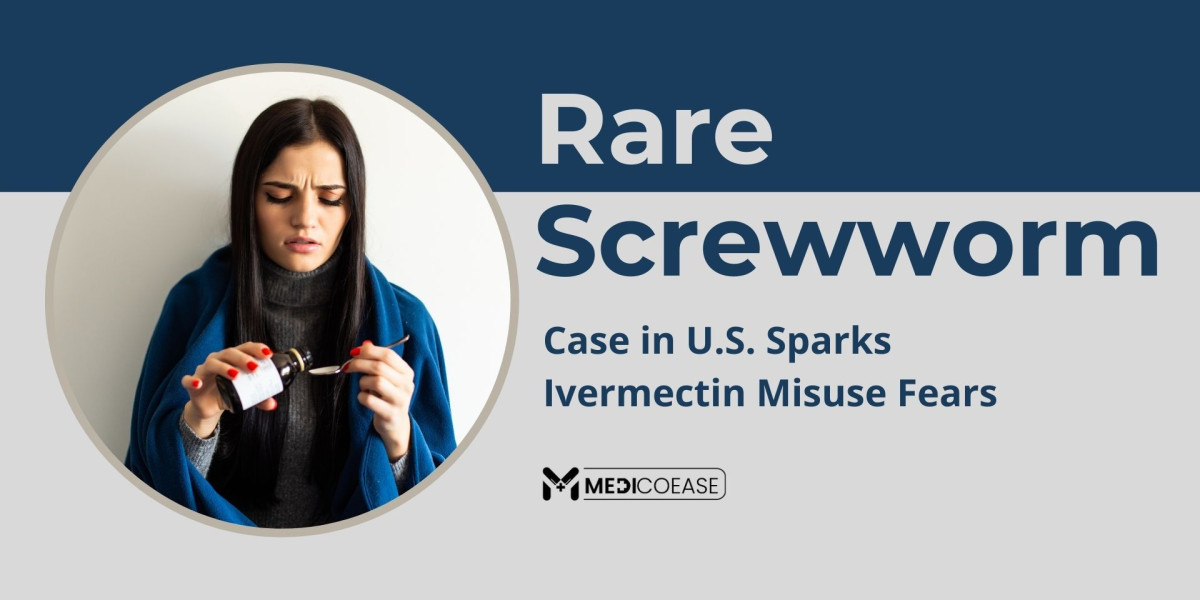In 2025, the United States witnessed a medical event that stirred both public concern and misinformation: a rare screwworm case. While extremely uncommon in humans, this infection quickly became headline news, igniting parasite fears and driving a surge of ivermectin misuse after screwworm case 2025. Health experts are now warning that panic-driven self-medication not only creates dangerous side effects like Ivermectin overdose but also worsens existing health misinformation crises in the U.S.
This blog explores how the rare screwworm case triggered confusion, why some Americans resorted to unsafe self-treatment, and how agencies like the USDA and FDA ivermectin regulators are responding. From false claims about Ivermectin cancer to dangerous online sales of Ivermectin 6mg and Ivermectin 12mg, the situation highlights critical gaps in public health education. We also examine the role of Niclosamide and Fenbendazole in parasite misinformation debates, the impact of Ivermectin COVID conspiracy carryovers, and the unique responsibility of healthcare providers to prevent panic-driven misuse.
? First Human Screwworm Case in Years Alarms U.S. Health Officials
The screwworm (Cochliomyia hominivorax) is a parasitic fly known for infesting livestock. According to Wikipedia, human cases are extremely rare in developed countries, with the last significant U.S. outbreak occurring decades ago. Yet in 2025, a confirmed human infection shook the medical community.
U.S. health officials warn ivermectin misuse after the patient’s case went public. While the USDA deployed rapid screwworm prevention strategies, the incident went viral on social media, where misinformation outpaced official guidance. Many people mistakenly believed that taking veterinary or over-the-counter doses of ivermectin could prevent infestation.
Unfortunately, these panic-driven responses overlooked scientific facts and risked severe health consequences. The CDC stressed that only proper medical treatment, wound care, and targeted insect control—not random antiparasitic use—are effective.
? Ivermectin Misuse Tied to Parasitic Infection Fears Nationwide
As the news spread, online forums and Facebook groups lit up with conversations about self-medicating. The long-tail keyword “parasite fears fueling ivermectin self-medication” quickly trended in Google searches.
Americans who remembered the COVID-19 misinformation wave assumed that the drug was a universal parasite cure. Many rushed to buy Ivermectin online, often through unsafe sources. Others stockpiled animal-grade products, mistaking them for human-safe alternatives.
This phenomenon reflects a deeper crisis: when fear spikes, misinformation spreads faster than science. Public health experts emphasize that misuse of Ivermectin misuse can lead to:
- Neurological toxicity
- Liver injury
- Seizures and coma in overdose cases
- Dangerous drug interactions
Reports of overdose cases have already increased in emergency rooms across southern states, where parasite concerns are historically higher due to warm climates.
⚠️ Experts Warn Against Self-Medication for Rare Tropical Diseases
Leading parasitologists and infectious disease doctors are speaking out. Self-medicating for exotic conditions without a diagnosis, they argue, can mask real symptoms and delay effective treatment.
The FDA ivermectin stance remains clear: ivermectin is approved for specific parasitic infections, but it is not a blanket preventive drug. Misuse, especially with unsupervised dosing of Ivermectin 6mg and Ivermectin 12mg, is reckless.
Experts also highlight parallels with the cancer misinformation trend. Just as unverified claims once fueled hope for miracle cures, the screwworm case has created a new wave of panic-based consumption. This shows that misinformation adapts to new fears, whether it’s cancer, COVID, or parasites.
? Niclosamide and Fenbendazole Roles in Parasite Misinformation Debates
Beyond ivermectin, two other drugs—Niclosamide and Fenbendazole—have entered online discussions. Both have legitimate medical or veterinary uses, but they’ve been swept into the misinformation cycle.
- Niclosamide: Historically used against tapeworms, it’s occasionally promoted online as a cancer or parasite cure-all, despite lacking evidence for these broader claims.
- Fenbendazole: A common veterinary dewormer, it has been wrongly hyped as a miracle treatment for both humans and pets outside regulated medical use.
These drugs demonstrate a pattern: whenever a rare disease emerges, communities searching for control often lean on familiar “miracle cures,” even if unsupported by science. Public health leaders warn that this culture of self-medication endangers lives and distracts from effective prevention methods.
?️ USDA Prevention Strategies Versus Ivermectin Misuse Risks
The USDA’s screwworm prevention strategies highlight a clash between science-based biosecurity and misinformation. For decades, the USDA has used sterile insect release programs, livestock monitoring, and border inspections to prevent screwworm reintroduction.
These strategies have kept the U.S. virtually screwworm-free. Yet in the wake of the 2025 case, prevention strategies were overshadowed by social media panic. Instead of trusting the USDA’s science-based measures, some citizens stocked up on antiparasitic drugs.
This misplaced trust in unverified remedies creates dual risks:
- Health harm from self-medication
- Undermining of official prevention programs
? Travelers’ Health Education Gaps Contribute to Misinformation Spread
The case also exposed another weakness: travelers’ health education gaps. Many Americans traveling abroad to tropical regions lack awareness of preventive strategies.
Instead of consulting travel medicine clinics, some turn to online communities where rare infections dominate discussions. This leaves them vulnerable to bad advice, risky online drug purchases, and misconceptions about how parasites spread.
Experts argue that strengthening CDC travel advisories, expanding access to telehealth consultations, and integrating better education into airline health guidelines could prevent panic-driven drug misuse in the future.
? Media Panic Worsens Public Reliance on Unsafe Drug Remedies
Media framing plays a powerful role. Sensational headlines about the screwworm case spread faster than nuanced medical explanations. Talk shows, YouTube influencers, and TikTok creators often amplify fears without providing context.
This environment allowed misinformation to thrive, much like during the pandemic. The difference today is that the old narratives have merged with new parasite fears, creating a recycling loop of myths.
Unfortunately, this panic-driven environment pushed many toward risky online purchases. While Medicoease remains the only safe online pharmacy providing regulated human-grade ivermectin, other websites continue selling unverified and potentially harmful products.
? Conclusion: Public Health vs. Panic-Driven Drug Misuse
The 2025 rare screwworm case in the U.S. revealed more than just a medical anomaly—it exposed the fragile balance between public health education and misinformation culture. From Ivermectin 6mg misuse to conspiracy-driven cancer claims, America’s healthcare system must now confront a new wave of myths.
Agencies like the USDA and FDA must work alongside social media platforms, travel medicine providers, and trusted pharmacies like Medicoease to curb unsafe practices. Without swift interventions, the U.S. risks another health crisis fueled not by the parasite itself, but by the drugs misused in its name.
❓ FAQ
Q1: What is the screwworm and why is it dangerous?
The screwworm is a parasitic fly whose larvae feed on living tissue. It poses serious risks to livestock and rare but severe risks to humans.
Q2: Can ivermectin prevent or cure screwworm infections?
No. The FDA approval does not cover screwworm infections. Proper wound care and medical treatment are the only safe approaches.
Q3: Why are people misusing ivermectin after the 2025 case?
Fear, misinformation, and memories of past debates are driving panic-based self-medication.
Q4: Are Niclosamide and Fenbendazole safe alternatives?
Not without medical supervision. These drugs have limited uses and are not proven safe for screwworm prevention in humans.
Q5: Where can I safely purchase ivermectin?
Only through trusted providers like Medicoease, which offers regulated Ivermectin 6mg and Ivermectin 12mg.







